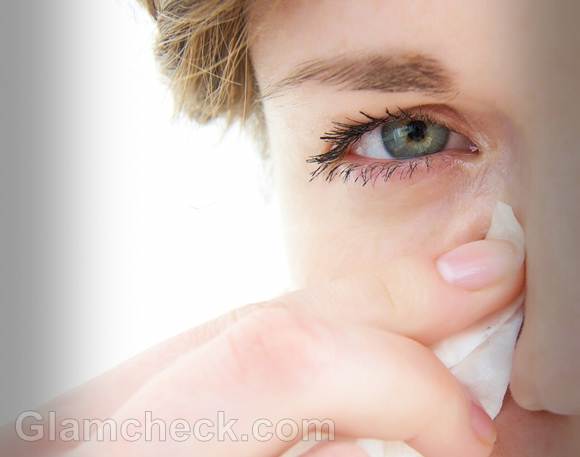You may have noticed when you’ve been out in pollution during the day how a little gooey gunk collects at the corner of your eye. This eye discharge could contain particles of dust, a fallen eye lash or even your eye liner or mascara. In a nutshell, the eye discharge has been instrumental in preventing harmful substances from getting into your eye.
Eye discharge is not automatically something to be afraid of, even though it can look rather icky and scary. Your eyes have an inbuilt system to get rid of unwelcome particles through eye discharge. So when you do have discharge from the eyes, it means that all is well and your eyes are taking care of themselves. However, this does not mean that you take eye discharge too lightly either as some types of it can be symptomatic of serious eye diseases and other health conditions.
Let’s take a look today at what the types of eye discharge, the other symptoms that may accompany discharge, the causes of the condition and the treatment options for some types of eye discharge.
Types of Eye Discharge
 Following are some of the characteristics of eye discharge.
Following are some of the characteristics of eye discharge.
- Colors: eye discharge can be yellow, green or clear.
- Texture: the consistency can be like a gel, or it can be pasty, almost-watery or gooey like pus.
Symptoms of Eye Discharge
Apart from the obvious eye discharge, there may be other symptoms that accompany it.
- The discharge can be sticky and can glue the eyelids shut during sleep. So you may wake up with a crusty layer of dried-up discharge on your eyelids, unable to open your peepers.
- Usually, vision is affected by eye discharge. You may start seeing double or your sight may get blurry.
- You may also suddenly get very sensitive to light, unable to withstand even the glare from your computer screen.
- Pain in eyes may also occur.
- Other symptoms include eye irritation such as itchiness, soreness or redness.
- The eyes may get watery.
- The eye discharge may be symptomatic of other health conditions such as the flu. Accompanying symptoms may thus include sneezing or coughing, a stuffy or runny nose, and possibly even aches and pains.
Causes of Eye Discharge
- The most harmless cause of eye discharge is environmental pollution. When particulates that are too large to be ejected by tears get stuck in the eye, the organs resort to creating a thicker discharge to trap and sweep the particles out.
- Chemical exposure can also lead to eye discharge as the eyes attempt to get rid of the offending substance.
- Eye infections such as pink eye or conjunctivitis can also cause eye discharge.
- Sleeping with your makeup on can cause it to seep into your eyes thus causing your eyes to fight back with eye discharge.
- The same goes for when you wear dirty or expired contact lenses. There will be an almost constant eye discharge as your eyes attempt to get rid of the lenses.
- An inflammation of soft eye tissue (blepharitis) can cause eye discharge.
- Do you have a really bad cold? Eye discharge may occur as a result.
- Eye discharge can also be a symptom of an allergic reaction.
- Those suffering from dry eye syndrome can sometimes have eye discharge too as a result of their condition.
- If there is a scratch on the cornea, eye discharge may occur.
- Two serious eye conditions can be the cause of eye discharge. One is orbital cellulitis and the other is periorbital cellulitis. Both are characterized by very nasty infections of the skin and tissue around the eyes.
Treatment for Eye Discharge
- If eye discharge is not treated or at least looked into to rule out the more serious causes, it could eventually lead to vision loss. If eye discharge is because of an infection, you risk spreading it the longer it is left untreated.
- The treatment for eye discharge will vary depending on what is causing it. Usually, different types of eye drops will be diagnosed to protect and heal the particular problem.
- If eye discharge is clear and not accompanied by pain, soreness, redness or itchiness, you can try to wash your eyes with water and then apply a drop of artificial tears to help clean out the eyes.
- Waking up in the morning with your eyelids crusted shut can be unnerving. Do not panic, but also do not try to force open your eye lids. Dab a damp, warm cloth against your eye until the crust dissolves. Another home remedy is to use a tea bag dipped in warm water over crusty eyes.
- While you have eye discharge, it is best to avoid cosmetics or lenses as this will just increase the likelihood of your eye discharge getting worse. Also ensure that you do not share your face towel with anyone else as you may inadvertently be spreading an infection.
Image: Shutterstock
